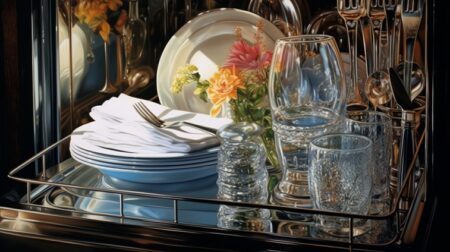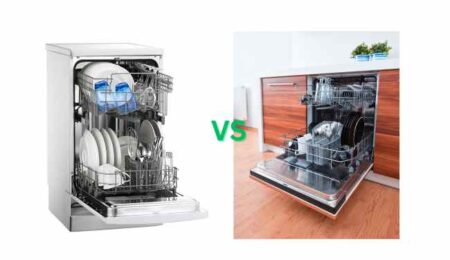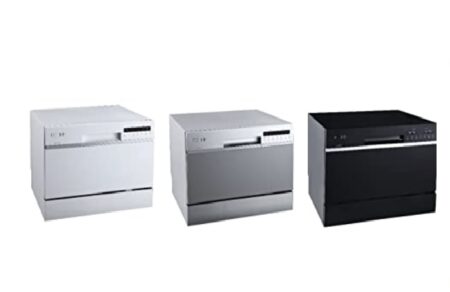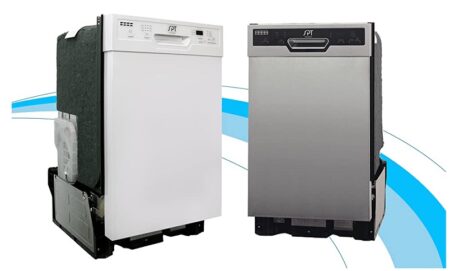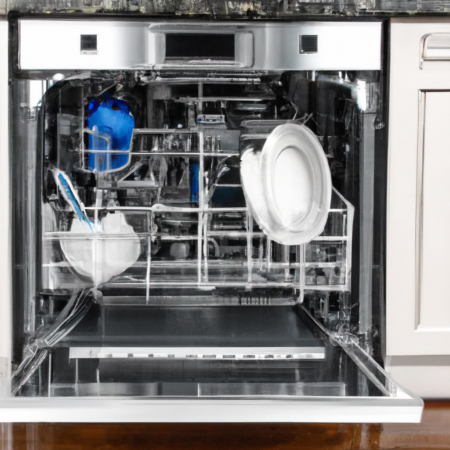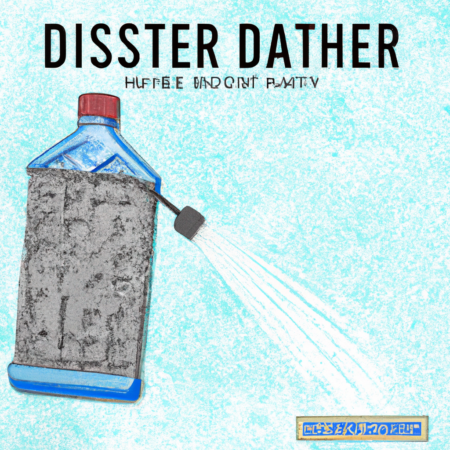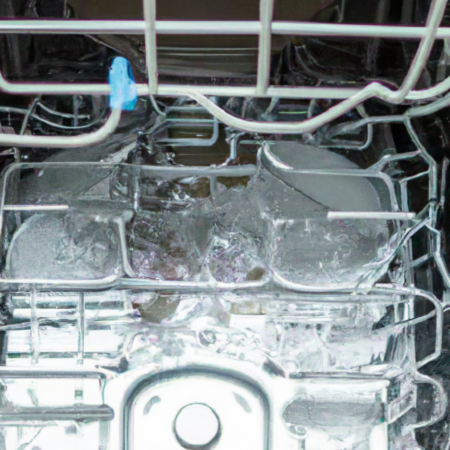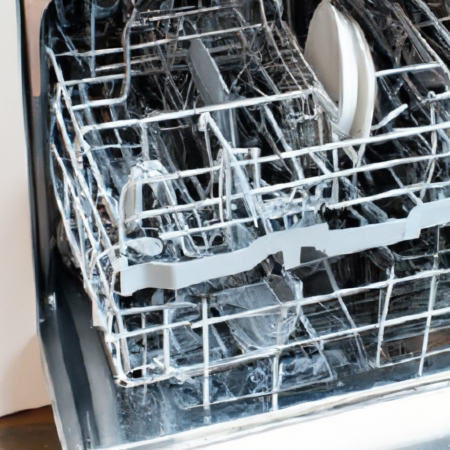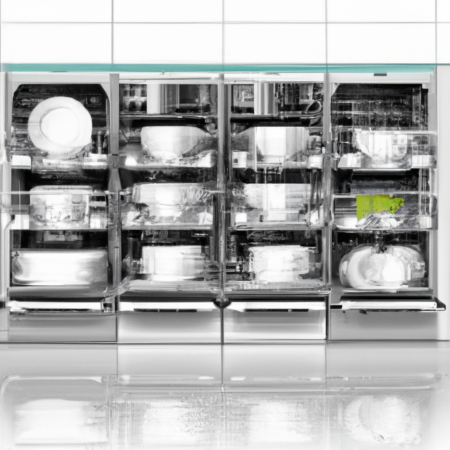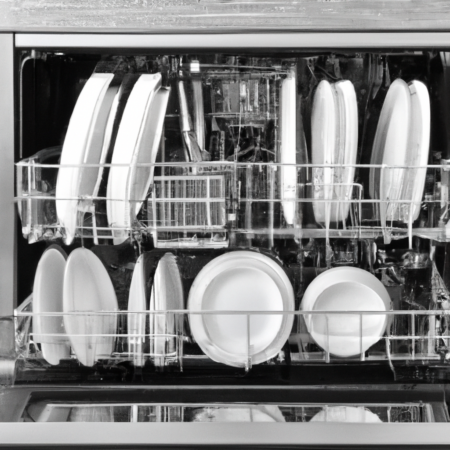Dishwashers are automatic, miraculous gadgets that save time in the kitchen, but they may also damage objects, which can be costly to fix or replace. It’s safer to wash these kitchen and dining room objects by hand. And if you must wash these objects in the dishwasher, place them on the top rack and accept your mistakes in the future.

In this article, I will tell you about 20 things that can prove to be disastrous for your dishwasher’s health and why you should never put them inside of it. Keep reading to find out.
- 20 Items You Should Never Put In The Dishwasher
- 1-Ceramics
- 2-Wooden Utensils
- 3-Cast Iron Cooking Ware
- 5- Aluminum Cooking Ware
- 6- Sieves
- 7- Sharp Knives
- 8- Copper Pans
- 9- Non-Stick Cookware
- 10- Acrylic Dishes
- 11- Thermal Containers
- 12- Plastic Items
- 13- Containers Having Labels
- 14- Printed Glassware
- 15- Pressure Cooker Lids
- 16-Gold Colored Flatware
- 17- Vintage or China Items
- 18- Sterling Silver Knives
- 19- Milk Glass Dishware
- 20- Crystals Dishes
- Conclusion
- Most Frequently Asked Questions
20 Items You Should Never Put In The Dishwasher
1-Ceramics
Ceramic utensils and cooking ware are famous for their nonstick surfaces. However, ceramics should never be washed in the dishwasher. Cast iron, aluminum, copper, and stainless steel can all benefit from a ceramic coating. You should hand wash all your ceramic cookware.
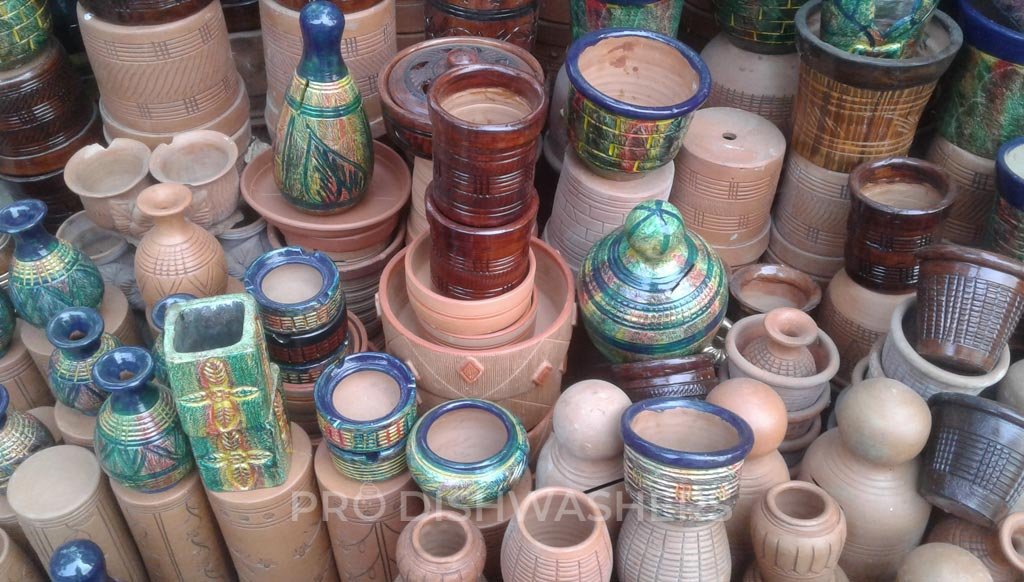
Reason:
Dishwasher detergents can include bleach and citric acids, which can damage the finish and break the seals of ceramic cookware decreasing their insulation and durability.
2-Wooden Utensils
It may be tempting to put wooden cutting boards, wooden spoons, wooden handles, and other wooden items in the dishwasher, but this is usually not a smart idea. I’d suggest you always wash wooden utensils and other wooden items by hand.
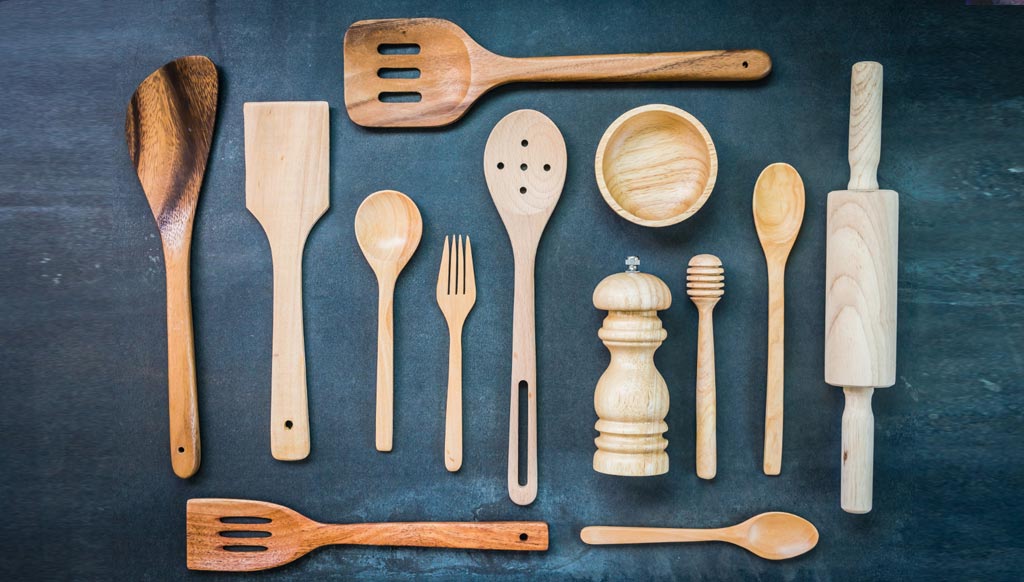
Reason:
Wood that is exposed to a lot of heat and moisture is prone to warping, splintering, and breaking. Harsh detergents, high heat, dishwasher water, and cycle time can all cause major damage to your wood cutting boards.
Also Read: How to Load Dishwasher Correctly
3-Cast Iron Cooking Ware
One of the many things that shouldn’t ever be placed inside a dishwasher, is cast iron pans and skillets. Although washing cast iron cooking ware in the dishwasher will not cause permanent damage, it can be hazardous for human health.
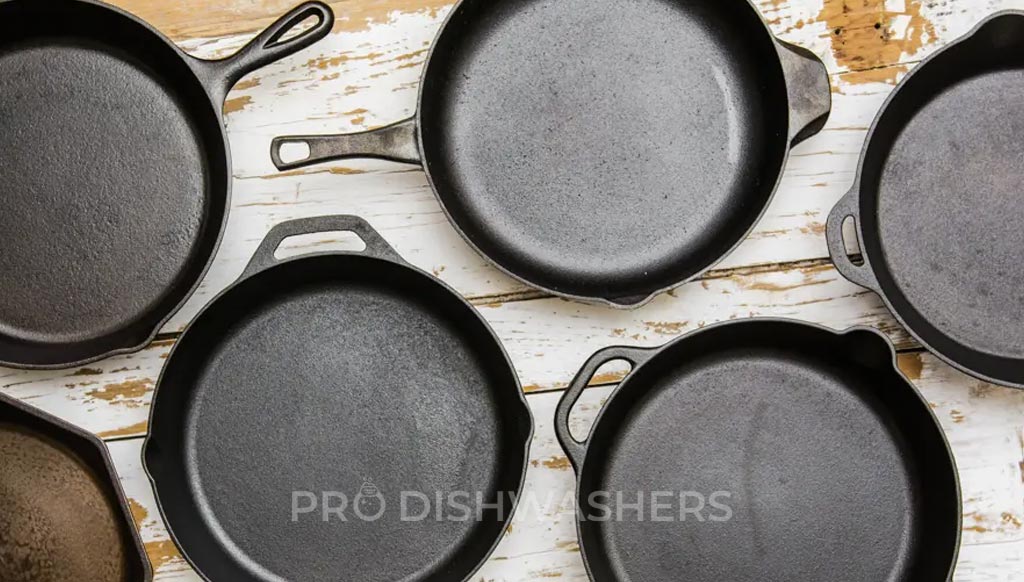
Reason:
The reason why you shouldn’t put your cast iron cookware in the dishwasher is that iron is a porous substance, and these pores grow even more when heated, and the temperature inside a dishwasher is extremely hot.
The issue here, however, is not the pores themselves, but rather what we let in them. Soap seeps into the pores of cast iron when it’s washed in the dishwasher. And once the water has evaporated, soap particles are left behind, ready to seep into your next meal.
Also Read: How To Clean Dishwasher Air Gap
4- Steel Grater
Graters should always be hand-washed, no matter what. As graters have really sharp edges which can damage the interior of the dishwashers and cause rusting. Hence, graters should be kept away from the dishwasher.
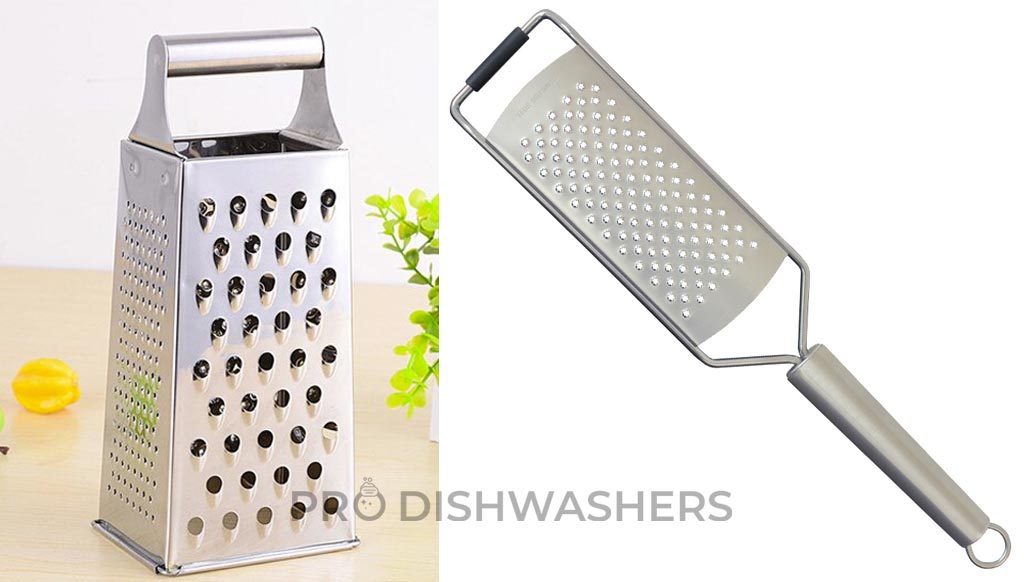
Reason:
It’s very hard for the dishwasher to remove all of the food particles if you stuff things with microscopic holes into the dishwasher, such as graters.
Also Read: How to clean dishwasher filter
5- Aluminum Cooking Ware
You’ve seen what happens when you put a gleaming disposable aluminum pie plate in the dishwasher. It darkens and becomes bland. Aluminum pots, pans, and baking sheets are all susceptible to corrosion. Harsh detergents can also damage the crockery. It is suggested to dispose of throwaway aluminum cooking ware and if it’s reusable, hand wash them with a sponge.
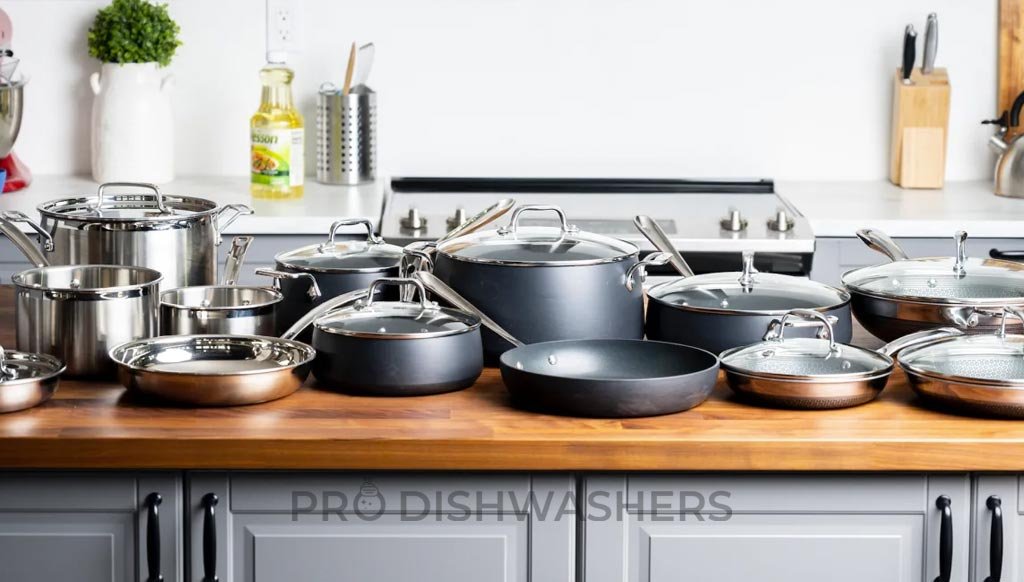
Reason:
Dishwashers use extremely hot water, which may discolor metal and aggressive dishwashing detergents can diminish the sheen. Don’t put aluminum pans or crockery in the dishwasher since they can leave marks on neighboring things as they move about during the washing cycle.
6- Sieves
Washing sieves in a dishwasher isn’t really a good idea, however, sieves with larger holes can be easily washed in the dishwasher. Sieves can also damage the interior of the dishwasher.
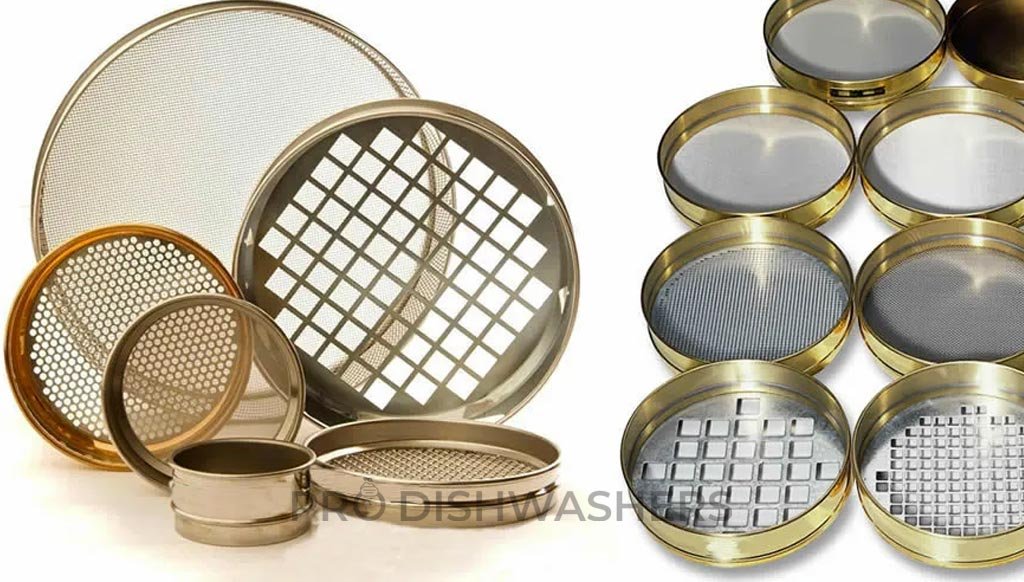
Reason:
Because of their small openings, sieves cannot be fully cleaned in a dishwasher. Hand-washing sieves is a good idea since you can reach out and clean the food particles more thoroughly than a dishwasher.
Also Read: 10 Easy Ways to Save Water While Using Dishwasher
7- Sharp Knives
Chef’s knives are an important part of your culinary arsenal, and not only because they’re inexpensive. To avoid dulling your excellent knives, keep them out of the dishwasher, even butter knives.
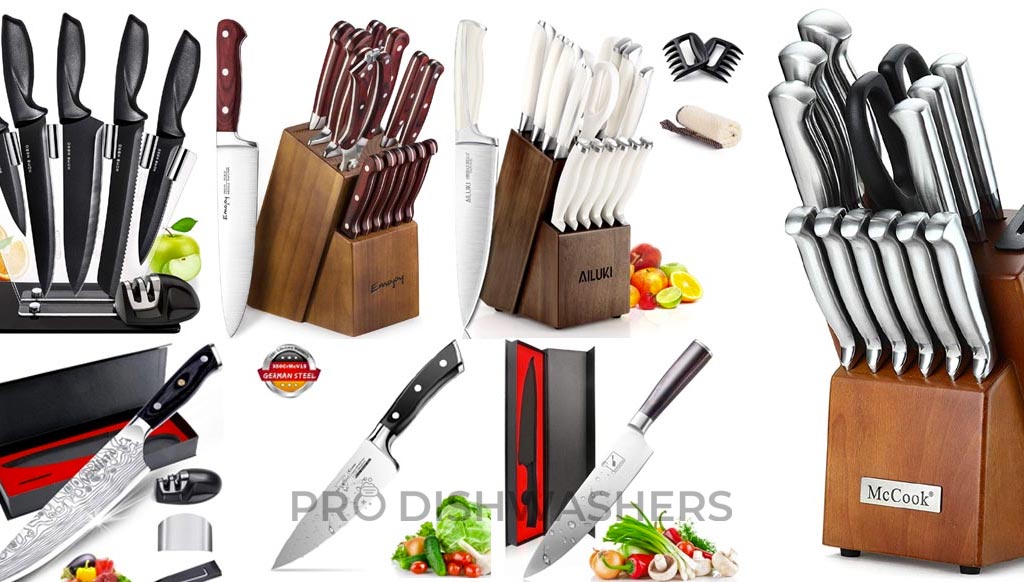
Reason:
For starters, the edges of sharp knives can pierce the protective covering of racks and baskets, allowing rust to develop. Second, those sharp edges can be hazardous while unloading the dishwasher, especially if children are around. We’ve published a detailed guide about how to load a dishwasher correctly do check it out.
Finally, strong dishwashing detergent can degrade edges and loosen or fracture hardwood handles. All kitchen knives should be washed by hand.
8- Copper Pans
It’s true that the shiny, beautiful copper mugs, pots, and pans are really attractive but, copper cookware is as delicate as it seems and dishwashers are a nightmare for them. So, you should always hand wash them.
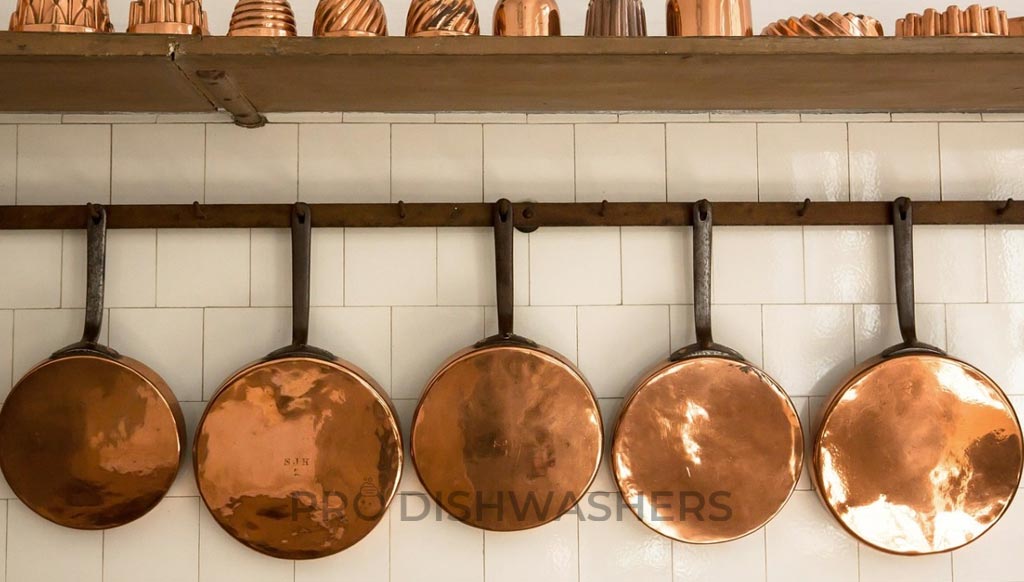
Reason:
Dishwasher detergent contains strong chemicals that can rapidly dull the surface and can be corrosive, causing the copper to pit.
Even with the greatest copper cleaning and elbow grease, pitting will not be erased. So, keep your copper pots away from dishwashers.
Also Read: How to Load Dishwasher Correctly
9- Non-Stick Cookware
Nonstick cookware does not keep up well in the dishwasher, even if the pan or pot indicates it is dishwasher safe. The detergents will wear away the coating over time. Nonstick pots and pans should always be hand washed.
It’s time to get a new pan as soon as the surface starts to show signs of wear. When a nonstick surface is scratched, chipped, or flaked, harmful poisons are released into the meal.
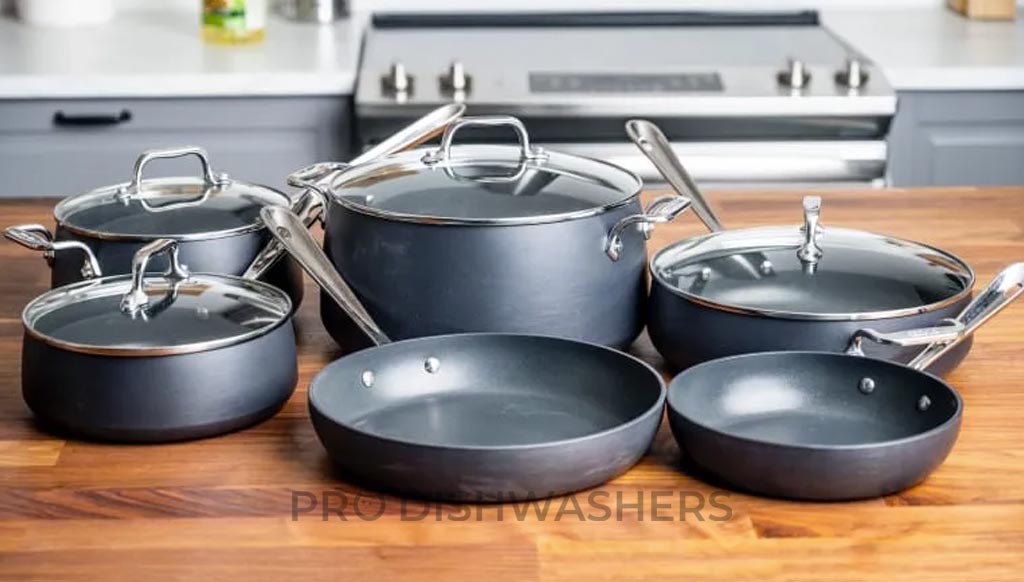
Reason:
Despite the fact that many nonstick pans are dishwasher safe, strong detergents and extremely high drying temperatures can damage the nonstick coating. If you want to wash your pans in the dishwasher, let them air dry instead of using the drying cycle.
10- Acrylic Dishes
Because of the brilliant colors and designs, light, unbreakable acrylic or melamine dishware is quite popular. Always hand-wash your acrylic dishes if you really like them and want them to last instead of tossing them in the dishwasher.
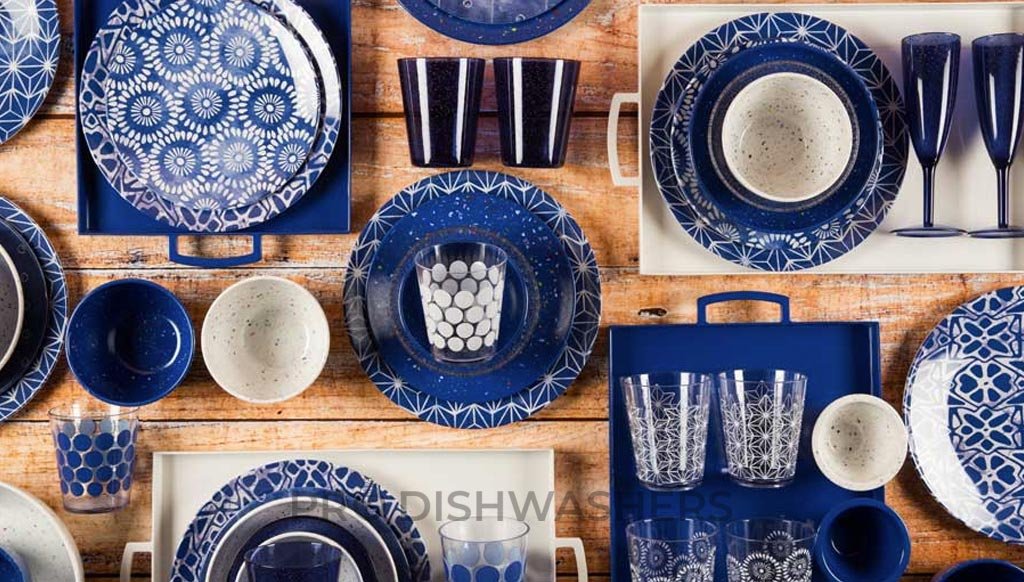
Reason:
These dishes can be ruined by excessive water and drying temperatures, as well as strong dishwashing detergents. Hairline splits and color and pattern loss are possible after multiple washes, especially for inexpensive sets.
11- Thermal Containers
Insulated mugs, tumblers, and containers made of plastic and metal are ideal for keeping hot drinks hot and cold drinks cold. The majority is made up of two layers of material with an airspace between them. The insulation is provided by the airspace. But you should never place them in dishwashers.
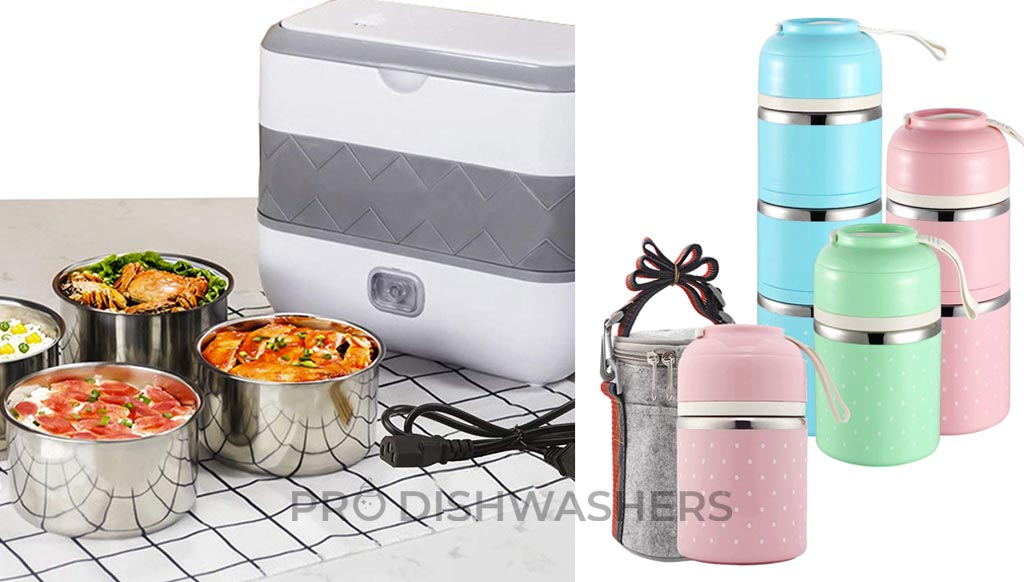
Reason:
The high heat and hot water of dishwashers can cause the seal to break and water can then enter the airspace, breaking the insulation. If you decide to put thermal containers in the dishwasher, utilize the top rack to avoid the extreme heat of the drying cycle.
12- Plastic Items
Plastic takeaway containers can be repurposed to keep them out of landfills, but the dishwasher isn’t the best location for them. Dishwasher-safe plastics, on the other hand, can be put on the top rack.
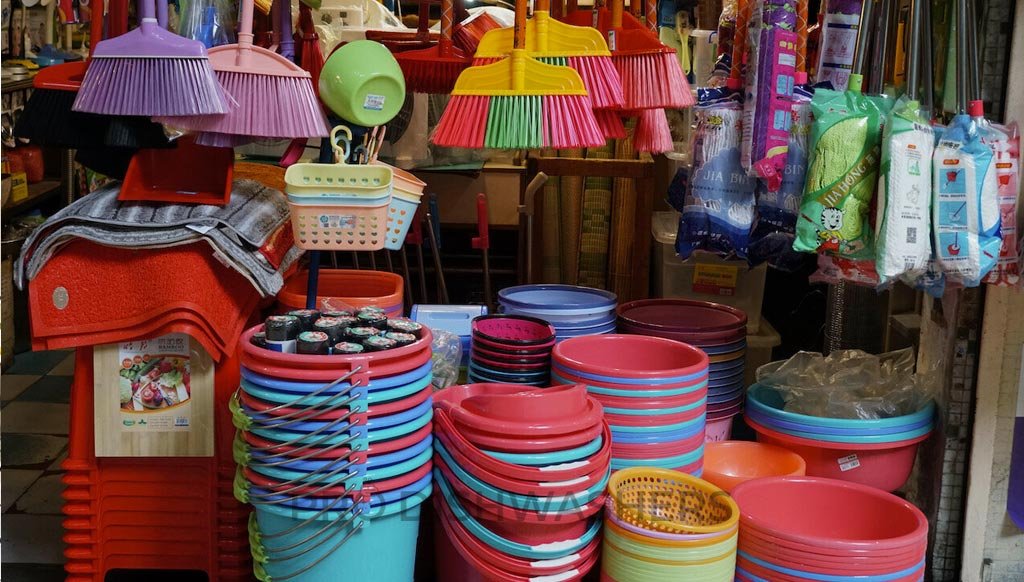
Reason:
According to the study, consumers should avoid microwaving food in thin plastic containers or putting them in the dishwasher since these practices might cause the plastic to produce dangerous chemicals. They may melt or distort as a result of the intense heat and hot water.
13- Containers Having Labels
Have you ever tried repurposing glass salad dressing or pickle jars? You may also store glass food jars for storage in addition to your plastic containers. Although, it isn’t the best idea to place labeled jars or containers in the dishwasher.
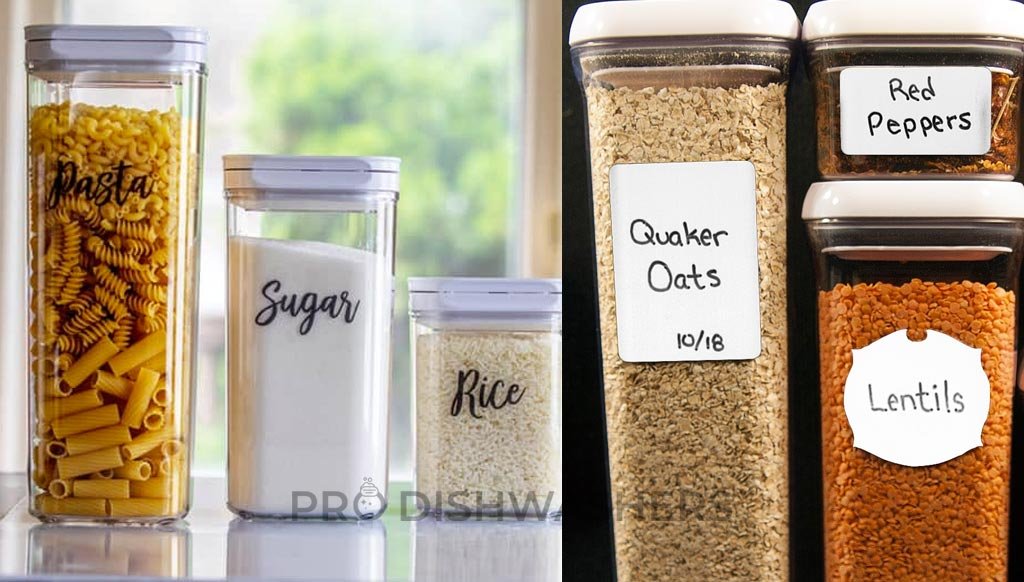
Reason:
f you remove the paper labels beforehand, you may put the jars in the dishwasher without any problems. The paper and glue may fall loose and block the dishwasher drain and filters if you don’t.
14- Printed Glassware
Commercial printing on glassware has improved over time, although it is still not foolproof in the dishwasher. It is better to hand wash any kind of printed glassware, such as measuring cups.

Reason:
In general, avoid placing any plates or glasses in the dishwasher that have been hand-painted or have any type of print. You obviously don’t want measuring cups without any lines. After each cycle, the ornamental flair will begin to fade due to the heat, pressurized water, and harsh detergent.
15- Pressure Cooker Lids
While a pressure cooker pot inner container can be washed in the dishwasher, the pressure cooker lids should never be washed in it. You should always hand-wash pressure cooker pots, lids, and gaskets.
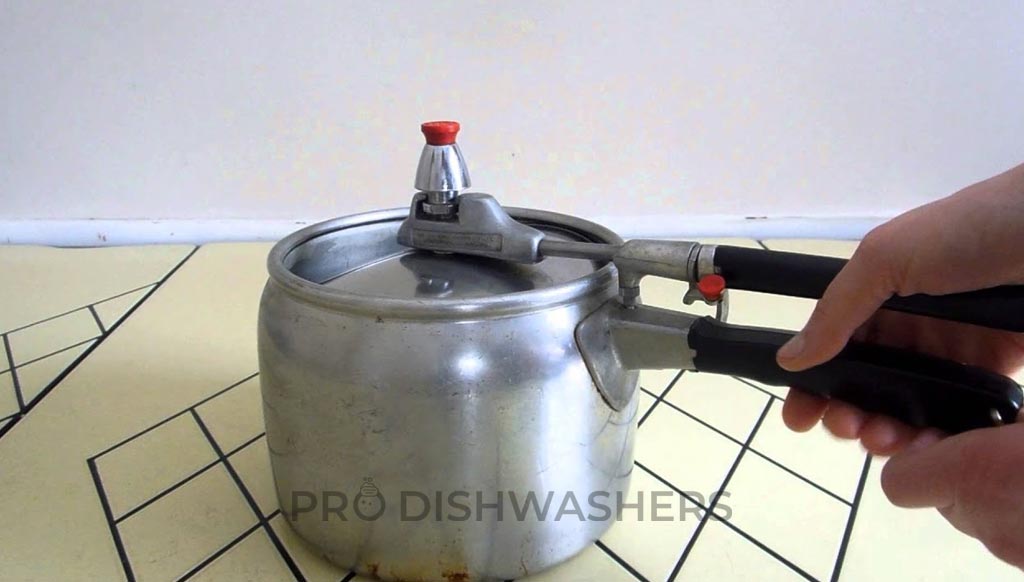
Reason:
The valves that govern how effectively the pressure cooker operates are located on the lid. A dishwasher’s movement can drive food particles into the valves and vents, causing the pressure cooker to malfunction or explode. The corrosive chemicals may also harm the lid’s rubber sealing.
16-Gold Colored Flatware
Gold-colored flatware will fade and discolor owing to the harsh dishwasher detergents, although sterling silver flatware holds up well in the dishwasher. Always hand-wash your gold plated tableware. Crockery having gold rims should also be kept away from the dishwasher.
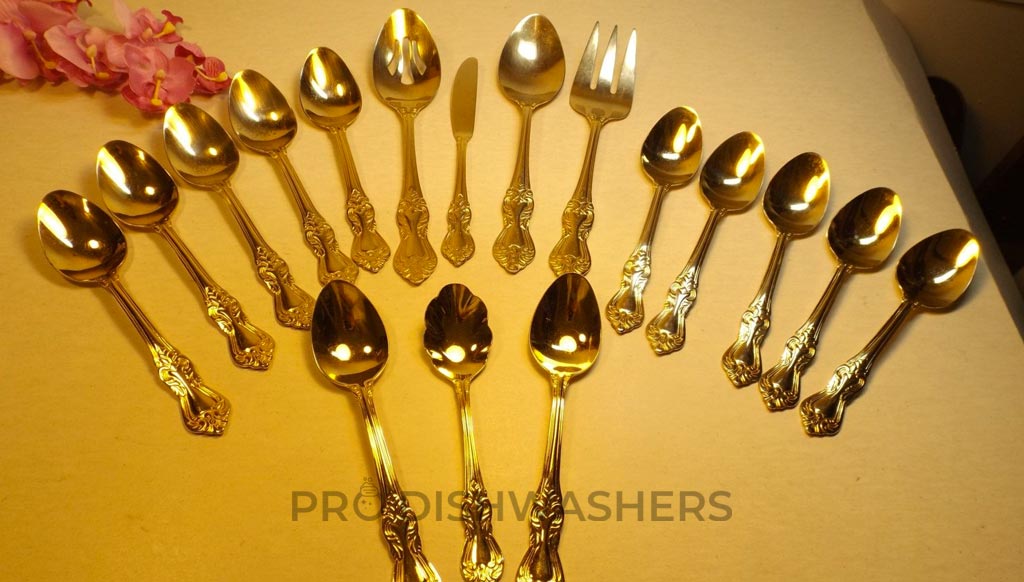
Reason:
In the dishwasher, gold-colored cutlery will lose its color and sheen. Heat and powerful dishwasher detergent can also cause them to discolor. Instead, hand-wash them and pat them dry with a soft cloth.
17- Vintage or China Items
Fine china, whether antique or embellished, will not survive in the dishwasher. You wouldn’t want to risk ruining your family heirloom, either. Skip the dishwasher and gently hand-wash china relics.
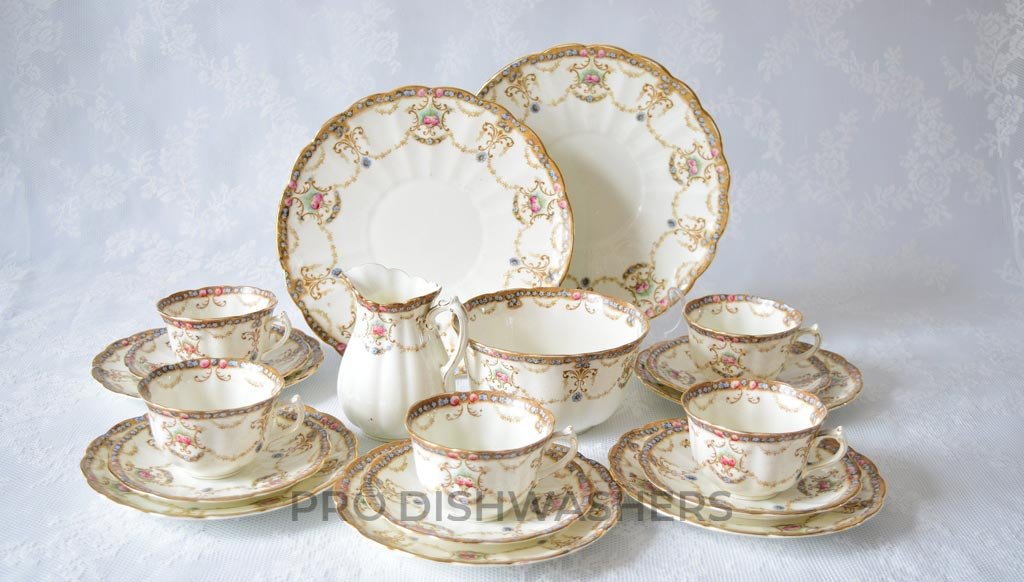
Reason:
You should never put fine china crockery into a dishwasher as very hot water temperature and harsh detergent solutions might cause fading and hairline cracks. It’s safer to hand-wash delicate china pieces.
Also Read: How to Clean Dishwasher Filter
18- Sterling Silver Knives
Sterling silver flatware washes through the dishwasher just as good as stainless steel flatware, except for sterling silver knives.
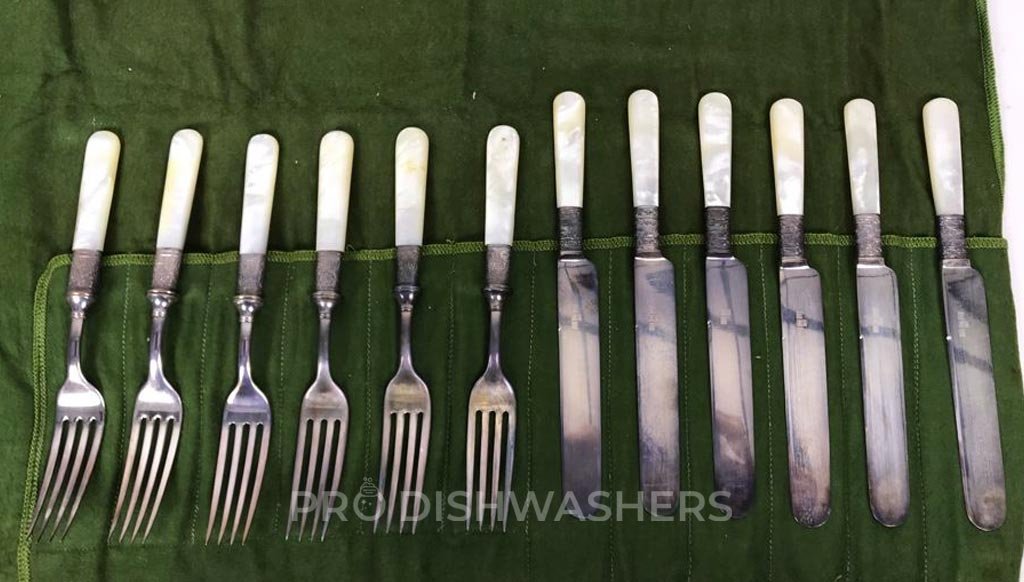
Reason:
The heat of the dishwasher can cause the glue that attaches the blade to the handle to melt and detach on many sterling silver knives. Instead, wash sterling silver knives by hand.
19- Milk Glass Dishware
If you have milk glass dishware, like milk glass vases or milk glass candle holders, be very careful not to put them in the dishwasher.
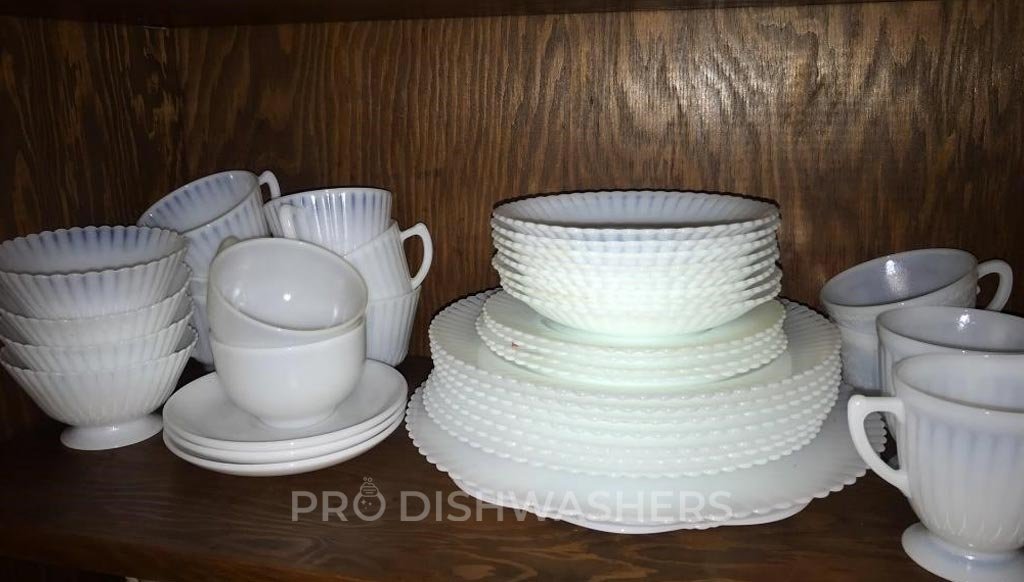
Reason:
The soap and water are likely to strip away the delicate milk paint on these items, which means they will look dull and will lose their milk paint and turn yellow.
20- Crystals Dishes
To avoid chipping, delicate crystal dishes should be hand cleaned. To minimize breaking, use the top rack and place the glasses between the tines, rather than over them, in the dishwasher. Remember that after being etched by the severe detergents, the lead crystal will have cloudy residue and become pitted.
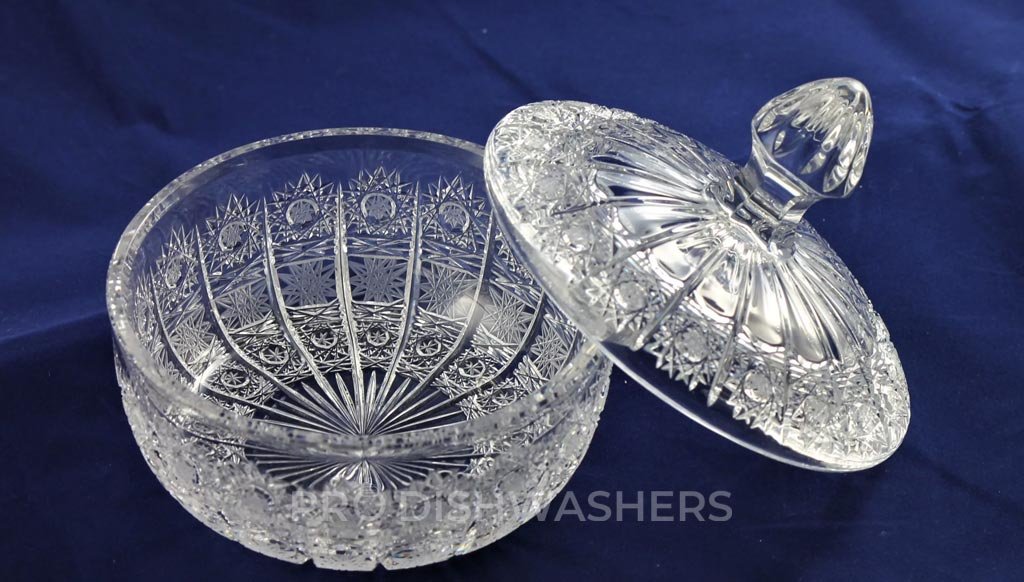
Reason:
Crystal is too delicate to withstand high temperatures and can break or chip in the dishwasher. Furthermore, detergents might remove their shine.
Also Read: How to Load Dishwasher Correctly
Conclusion
Even though dishwashers make our work easy by washing and cleaning all our dishes, some types of dishes, utensils, and crockery should never be washed in the dishwasher to avoid getting them damaged permanently.
READ ALSO
- How to Load Dishwasher Correctly
- How To Clean Dishwasher Air Gap
- How To Fix Dishwasher Not Draining
- How To Prevent & Remove Mold From Dishwasher
- How to Descale Dishwasher
- How to Clean Dishwasher Filter
- How to Get Rid of Ants in Dishwasher
- 10 Easy Ways to Save Water While Using Dishwasher
- Best Dishwasher Detergents





